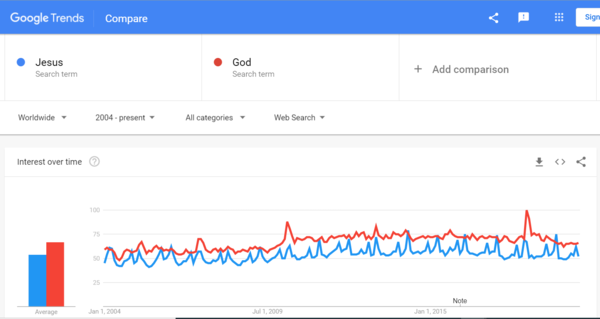Atheism Vs. Theism
 From Conservapedia
From Conservapedia The website Allaboutphilosophy.com declares:
| “ | In a nutshell, the Atheism vs. Theism debate comes down to the following:
The Atheist’s Response to the Theist: 1. God doesn’t exist because science explains the cosmos without him. 2. Even if a finely-tuned cosmos and/or complex life suggest a first cause/designer, there’s too much pain and suffering in the world to believe in the Judeo-Christian God. 3. The Judeo-Christian Bible is myth and legend. 4. A moral life doesn’t require God, anyway. The Theist’s Response to the Atheist: 1. Science affirms that the finely-tuned cosmos was created out of nothing. 2. Life's order, design, and complexity require an Intelligent Designer, and our response to pain and suffering is relative to our knowledge of right and wrong/good and evil in a fallen world. 3. The Bible is trustworthy based on history, science, archaeology, manuscripts, and prophecy. 4. True morality requires a transcendent standard -- God.[2] |
” |
Contents
Atheism vs. theism resources[edit]
Global resurgence of religion and desecularization[edit]
Desecularization is the process by which religion reasserts its societal influence though religious values, institutions, sectors of society and symbols in reaction to previous and/or co-occurring secularization processes.[3] Desecularization can also occur through providential acts of God and in reaction to God granting Christian's prayers.[4]
From a global perspective, religion is seeing a resurgence and scholars of religious demographics frequently use the term "global resurgence of religion" to describe the process of desecularization which began in the late portion of the 20th century.[5]
As a percentage of the world's population, atheism peaked in 1970.[6]
Global atheism is expected to decline in the 21st century and beyond in terms of its global market share.[7] Presently, there are a number of excellent sources which indicate that atheism is shrinking in global market share (see: Global atheism statistics).
Google trends world data: 2004 to 2020, Atheism/agnostic terms vs. God/Jesus terms[edit]
See also: Desecularization and Internet atheism and Internet evangelism: Christians vs. atheists and Google trends - Atheism and agnosticism terms
External links[edit]
- Theism, Atheism, and Rationality by Alvin Plantinga
References[edit]
- ↑ Revelation 22:13
- ↑ Atheism vs. Theism Debate, Allaboutphilosophy.com
- ↑ Religion and the State in Russia and China: Suppression, Survival and Revival by Christopher Marsh, 2011, page 11 (Christopher Marsh cites the definitions of desecularization given by Peter L. Berger and Vyacheslav Karpov)
- ↑
- Miracles seen in China revival Published on 20th January 2008
- Revival, Miracles in China during Bible Deliveries, Teresa Neumann : Nov 28, 2012 : Staff – Mission Network News
- Jesus in the Rice Fields: China's Countryside Revival By George Thomas, CBN News Sr. Reporter, Friday, August 09, 2013
- China Cry: A True Story (1990)
- ↑ The return of religion
- ↑ Atheism Peaks, While Spiritual Groups Move Toward Convergence by Nury Vittachi, July 14, 2015, website Sciene 2.0
- ↑
- Shall the Religious Inherit the Earth?: Demography and Politics in the Twenty-First Century by Eric Kaufmann, Belfer Center, Harvard University/Birkbeck College, University of London
- Study: World is becoming more religious
- Globally the worldviews of atheism and non-religious (agnostic) are declining while global Christianity is exploding in adherents
- Gordon-Conwell Seminary - Status of Global Mission, 2014, in the Context of AD 1800–2025
- Atheism Peaks, While Spiritual Groups Move Toward Convergence by Nury Vittachi, July 14, 2015, website Sciene 2.0
↧ Download as ZWI file | Last modified: 02/26/2023 04:39:53 | 44 views
☰ Source: https://www.conservapedia.com/Atheism_vs._theism | License: CC BY-SA 3.0
 ZWI signed:
ZWI signed:


 KSF
KSF